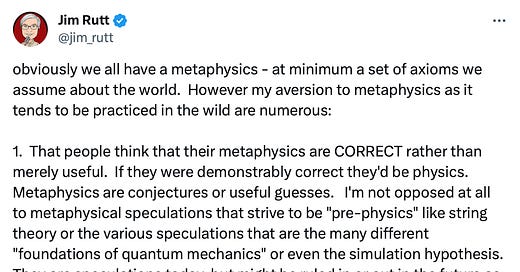Jim Rutt (who posted the points above on his X account a few days ago) has invited me onto his podcast to discuss the meaning and importance of metaphysics (a.k.a., speculative philosophy). That conversation won’t happen for a couple months, so for now I’ll offer a few preliminary thoughts in response to his post above.
I agree with him, of course, that metaphysics is unavoidable. But it needn’t be axiomatic.
Metaphysics is the search for premises, NOT deduction from clear premises. I reject metaphysical foundationalism of any kind. Our elaboration of categoreal conditions should be an open-ended, revisable process, always subject to the pragmatic test. The sole justification for a metaphysical idea is that it elucidates experience.
I share Jim’s concern about metaphysics “as it tends to be practiced in the wild.” Certainty is not possible in metaphysics (nor in physics!). We need a more diplomatic method of philosophizing together! Partisanship in metaphysics is just as destructive as it is in politics. It is important to seek deep understanding of multiple approaches.
Strictly speaking, all metaphysical systems are false. The same is true of all scientific models. “Use” is not the only criterion of evaluation, however. Our metaphysics should pass the rational tests of consistency and coherence, and the empirical tests of adequacy and applicability.
These are the criteria Whitehead lays out in Process and Realty, at least, and I’m not sure I can do better. His empirical criteria cover but extend beyond just instrumental use.
Metaphysics doesn’t become physics when proven correct. Again, no physical model is strictly “correct”
or subject to “proof.” Physical science is not just the part of metaphysics that got proven true. That would be to misunderstand the aim of metaphysics, which is to search for the general presuppositions of physical science itself. What else must be the case if physical knowledge is possible?On parsimony, I’d say we should strive for simplicity but not be afraid to accept complexity. I’m sure Jim would agree! But again, the aim of speculative philosophy is not to become a special science, it’s to search for the premises of not only science, but human experience more broadly.
With all due respect to physicist Lawrence Krauss, why there should be something rather than nothing is never going to be a strictly scientific question.
I’d add that given the aporia of the hard problem of consciousness, there’s a decent argument for panexperientialism on grounds of parsimony.Of course complexity is natural! “Metaphysical” doesn’t mean beyond nature or supernatural. If I ask you to explain what you mean by “natural phenomena,” you’d only be able to answer me by doing metaphysics. It’s just what we do when we get meta- about things.
The complexity sciences do have metaphysical implications. E.g., to acknowledge that novel regimes of order can emerge atop or within earlier regimes tells us something important about nature’s “laws.” This topic will make for very interesting conversation when Jim and I speak. [I’ve shared my coauthored chapter (with astrobiologist Bruce Damer) on the metaphysical and cosmological presuppositions of the origin of life with Jim, wherein I discuss the process philosophical understanding of laws of nature as emergent habits.]Consciousness is a loaded word. I agree it has biological roots, but I’m not sure living organisms can be so easily integrated into standard physicalist science. Vitalism and mechanism are just inverted mirror images of one another. The science of Complex Systems takes us beyond both.
We inhabit an organic universe. Self-organization is powering the cosmic process at every scale. There is no inert matter anywhere. Nor is there some invisible vital force driving bodies around. Energy has a tendency to order itself, to take on habits, to evolve.
And yes, eventually energy becomes conscious.
Doing metaphysics doesn’t mean wildly speculating without any concern for scientific facts. Philosophers ought to pay close attention to the sciences. Metaphysics just seeks deeper coherence between the sciences and human experience.




